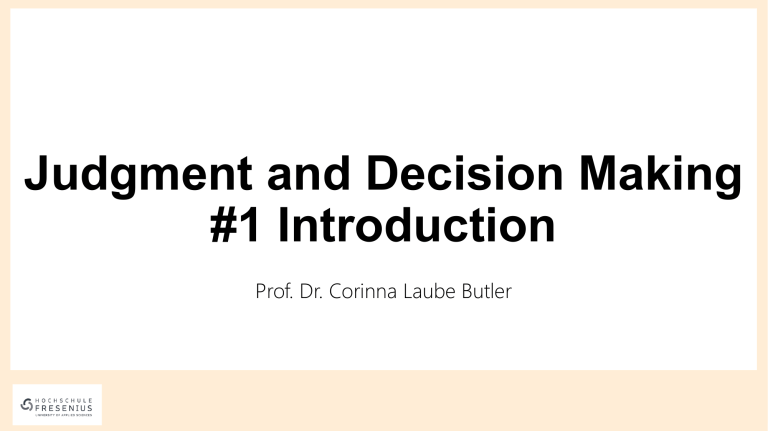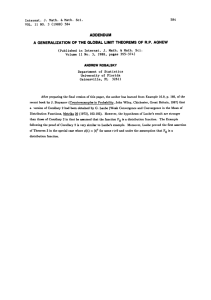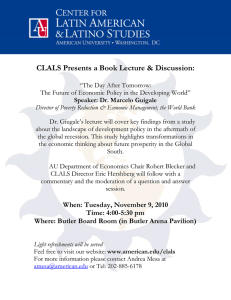
Judgment and Decision Making #1 Introduction Prof. Dr. Corinna Laube Butler Let´s get to know each other director of Prof. Dr. Corinna Laube Butler Dean of Psychology and Program Mindfulness and Leadership (M.sc.) Email: corinna.laube_butler@hs-fresenius.de Tel.: +49 (0)30 7001579-13 cori_laube Judgement and Decision Making I Prof. Laube Butler I MIBM/MDME 2 Judgement and Decision Making I Prof. Laube Butler I MIBM/MDME 3 Let´s get to know each other Your background? Your most favorite book? If you had 1mio Euros, what would you do with that? Your hobbies? Your role model and why? Your favorite restaurant/bar/place in Berlin? Judgement and Decision Making I Prof. Laube Butler I MIBM/MDME 4 The 36 Questions that can lead to love (Aron et al. 1997) Do you have a secret hunch about how you will die? Share a personal problem and ask your partner’s advice on how he or she might handle it. Also, ask your partner to reflect back to you how you seem to be feeling about the problem you have chosen. Before making a telephone call, do you ever rehearse what you are going to say? Why? If you could change anything about the way you were raised, what would it be? Is there something that you’ve dreamed of doing for a long time? Why haven’t you done it? Judgement and Decision Making I Prof. Laube Butler I MIBM/MDME 5 My expectations Active participation Questions questions questions (it´s your time, use it!) Amazing presentations Judgement and Decision Making I Prof. Laube Butler I MIBM/MDME 6 Your expectations? Judgement and Decision Making I Prof. Laube Butler I MIBM/MDME 7 Conditions Learning Outcomes/Competences: The students know the process of human judgement and decision-making behaviour in practice, and are in a position to distinguish these from normative decisionmaking models. They are able to describe both the micro and macro-economic consequences of the underlying behavioural approaches. In-class study: 56h Self-study: 69h Students understand under which conditions specific aspects of human decision-making emerge. Furthermore, they are familiar with strategies with which targeted action can be taken to affect the architecture of decisions, in order to promote specific patterns in decision-making 5 credit points Judgement and Decision Making I Prof. Laube Butler I MIBM/MDME Total of 125h 8 Conditions Teaching Methods: Type of exam: In-class study: Lecture and seminar with literature study guidance. Self-Study: Literature study and preparation of lectures, presentations and project reports Students complete this module by passing a written exam, which comprises 90 minutes. Judgement and Decision Making I Prof. Laube Butler I MIBM/MDME 9 Literature Bazerman, M. H. & Moore, D. A. (2009): Judgement in Managerial Decision Making. 8th Edition. Wiley Recommened readings: Gigerenzer, G., Hertwig, R., & Pachur, T. (Hrsg.) (2011): Heuristics: The Foundation of Adaptive Behavior, Oxford Kahneman, D. (2011): Thinking, fast and slow, 15. Aufl., New York Thaler, R., & Sunstein C. (2009): Nudge – Improving decisions about health, wealth and happiness, London Judgement and Decision Making I Prof. Laube Butler I MIBM/MDME 10 Materials You find all materials (slides, papers etc.) in Ilias Judgement and Decision Making I Prof. Laube Butler I MIBM/MDME 11 #1 Introduction to Managerial Decision Making 1. 2. 3. 4. 5. The Anatomy of Decisions System 1 and System 2 Thinking The Bounds of Rationality Introduction to Judgmental Heuristics Syllabus Judgement and Decision Making I Prof. Laube Butler I MIBM/MDME 12 The Anatomy of Decisions Judgments involve cognition Common decision situations: How to select a post-MBA job? Who to hire for your company? What startups should you fund? Which firm to acquire? What do these scenarios have in common? Judgement and Decision Making I Prof. Laube Butler I MIBM/MDME 13 Example You are finishing your MBA at a well-known school. Your credentials are quite good, and you expect to obtain job offers from a number of consulting firms. How will you select the right job? Judgement and Decision Making I Prof. Laube Butler I MIBM/MDME 14 Six Steps to Rational Decisions Six Steps to Rational Decisions 1. Define the problem 2. Identify the criteria 3. Weigh the criteria 4. Generate alternatives 5. Rate each alternative on each criterion 6. Compute the optimal decision Judgement and Decision Making I Prof. Laube Butler I MIBM/MDME 15 Homo economicus Judgement and Decision Making I Prof. Laube Butler I MIBM/MDME 16 Assumptions The concept of Homo Economicus relies on the assumption that people act in their rational self-interest i.e. they do what is best for them ● People know what they want and their priorities ● People can judge the benefit (or utility) the consumption of a good will bring ● People have stable preferences over time ● People act selfishly i.e. seek to satisfy their own needs Judgement and Decision Making I Prof. Laube Butler I MIBM/MDME 17 Homo economicus vs homo sapiens What prevents us from making „optimal“ decisions all the time? Judgement and Decision Making I Prof. Laube Butler I MIBM/MDME 18 Decision Making Theories Two schools of thought: 1. Prescriptive models: How decisions should be made 2. Decriptive models: how decisions are actually made BUT significant deviations between normative and descriptive models occur – one example…… Judgement and Decision Making I Prof. Laube Butler I MIBM/MDME 19 St. Petersburg Paradox Described by Daniel Bernoulli in 1738, a.k.a. St. Petersburg Lottery, Bernoulli’s Paradox Rules of the lottery: a fair coin is tossed repeatedly, until a tail appears, ending the game the pot starts at €1 and is doubled each time a head appears; after the game ends, you’ll win whatever is in the pot 1. Imagine you have a ticket to play the game (once). For how much would you be willing to sell it (i.e., what price would you ask for it)? 2. What is the expected payoff of the lottery? Judgement and Decision Making I Prof. Laube Butler I MIBM/MDME 20 St. Petersburg Paradox This is an example of a game where nobody follows the expected payoff principle Possible outcomes are not limited (in theory, heads can appear any number of times in a row) → average payoff is a weighted sum of infinite number of values: Judgement and Decision Making I Prof. Laube Butler I MIBM/MDME 21 System 1 and System 2 Thinking a descriptive model System 1 System 2 Intuitive Fast Automatic Effortless Implicit Emotional Slow Conscious Effortful Explicit Logical Judgement and Decision Making I Prof. Laube Butler I MIBM/MDME 22 Which Table is Longer? Judgement and Decision Making I Prof. Laube Butler I MIBM/MDME 23 Which Table is Longer? System 2: both tables are the same lenght and width System 1:Table on the lift is longer and skinnier than the table on the right Judgement and Decision Making I Prof. Laube Butler I MIBM/MDME 24 System 1 and System 2 Thinking a descriptive model Please calculate: 2x2=? 27 x 34 = ? System 1: 4 If a baseball bat and a ball cost a total of $1.10, and the bat costs $1 more than the ball, then how much does the ball cost? System 1: $0.10 System 2: 918 System 2: $0.05 Judgement and Decision Making I Prof. Laube Butler I MIBM/MDME 25 System 1 and System 2 Thinking a descriptive model Please decide fast: An amazone voucher for 10 Euros now vs. An amazone voucher for 20 Euros that costs 7 Euros Judgement and Decision Making I Prof. Laube Butler I MIBM/MDME 26 Bounded Rationality Framework by Herbert Simon (1958): Time and cost constraints limit the quantity and quality of availabe information Individuals are also constrained by their memory capacity, perception and attention Saticificing rather than maximising: Rather than examining all possible alternatives, we search until we find a satisfactory solution that will suffice because it is good enough Judgement and Decision Making I Prof. Laube Butler I MIBM/MDME 27 Bounded Rationality We use heuristics Heuristics are cognitive short-cuts that we use to make decisions. - They serve as simplifying strategies and rules of thumb to make quick decisions. - While they facilitate the process of making decisions, in some cases, they are misleading (cognitive biases) We discount the future We have limited willpower and as a result, we often weight the importance of the present much more than the importance of the future We care about others’ outcomes Bounded awareness We are not always aware of obvious and readily available information Bounded ethicality We also display inconsistent ethical behavior in ways that we are unaware of Judgement and Decision Making I Prof. Laube Butler I MIBM/MDME 28 Heuristics applied You are looking to hire a marketing MBA student for your company. You decide to limit your search to new MBA’s from the top six management schools. Judgement and Decision Making I Prof. Laube Butler I MIBM/MDME 29 Introduction to Judgmental Heuristics Exercise Please do some research on the following heuristics and design one or two powerpoint slides to explain it. 1.The Availability Heuristic 2.The Representativeness Heuristic 3.The Confirmation Heuristic 4.The Affect Heuristic Judgement and Decision Making I Prof. Laube Butler I MIBM/MDME 30 Topics Bounded Awareness Common Biases Overconfidence Introduction & getting to know each other Framing & Reversal of Preferences Behavioral Decision Making Motivational and Emotional Influences on Decision Making Thinking Fast and Slow Judgement and Decision Making I Prof. Laube Butler I MIBM/MDME Nudging & Boosting 31 Thinking Fast and Slow Judgement and Decision Making I Prof. Laube Butler I MIBM/MDME 34 Expectations for the Presentation Minimum 30min, maximum 60min Well structured, clean and nice slides (pictures, one slide-one thought) Entertaining and fun (ideally also group excercises, role play, demonstrations – there are no limits, be creative) Minimum of one exercise! Feel free to do your own research and include recent newspaper articles, blogposts etc. (always indicating the source!) Please send me the slides the latest Sunday before the lecture via Mail Judgement and Decision Making I Prof. Laube Butler I MIBM/MDME 35 BONUSPOINTS You can get up to 9 Bonuspoints for the presentation: − Quality of slides (format, grammar, one thought/one slide, easy to read, lots of pictures etc.) - 2 points - Quality of content (information well structured, most important aspects highlighted, logical to follow, take home messages, examples etc.) 3 points - Presentation style (free and clear speech) – 2 points - Involvement of audience – 1 point - Keeping the deadline – 1 point Judgement and Decision Making I Prof. Laube Butler I MIBM/MDME 36 Presentations Look into Ilias for the google docs link Judgement and Decision Making I Prof. Laube Butler I MIBM/MDME 37 Write down your take home message! Three facts/skills you learned today Judgement and Decision Making I Prof. Laube Butler I MIBM/MDME 38

